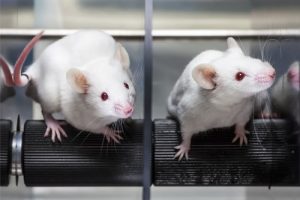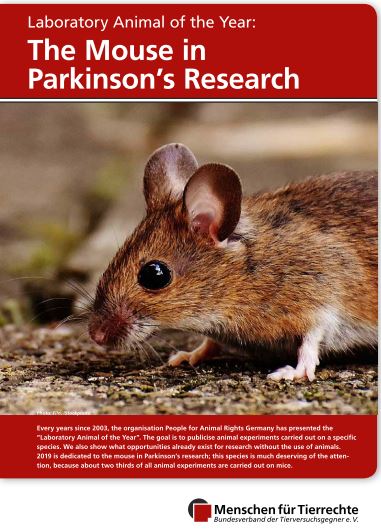People for Animal Rights Germany present this year’s nomination for the Laboratory Animal of the Year: The Mouse in Parkinson’s Research. With the yearly nomination the animal rights organisation strives to spotlight the hidden sufferings of animals and to call attention to the fact that the implementation of animal free scientific methods would be important for the suffering humans as well. Because in spite of numerous manipulations of mice there is no effective cure for the disease to date. In order to make the essay available beyond the German-speaking area, we have now published an English version for interested readers.

Parkinson’s disease: no cure despite numerous animal experiments
The Parkinson’s disease (PD) ranks as the second most common neurodegenerative disease following Alzheimer’s disease. In Germany it affects between 250,000 and 280,000 people. The death of dopamine-producing neurons causes the characteristic motoric symptoms like tremor at rest, slowness of movement, muscle rigidity or rigid facial expressions. The gold standard treatment to this day is Levodopa, a drug developed in the 1970s. But the currently available treatment methods only ease the symptoms. The frantic search for new treatments comes along with the suffering and death of innumerable mice. The mouse is the most used laboratory animal. In 2017 animal experiments for PD research involving almost 66,000 mice were approved in Germany. But the mouse does not naturally suffer from PD. Thus, the animals are genetically modified or poisoned with neurotoxins to simulate the human symptoms of the disease.
Scientifically questionable animal models
“Countless mouse manipulations have to date not led to an effective therapy. No animal model can reproduce all aspects of the human Parkinson’s disease. Over 50 clinical studies with patients failed even though the active substances worked in the animals before. To actually help the suffering patients it has been long overdue for science to count on human-specific approaches instead of artificially diseased mice”, demands Dr Christiane Hohensee, Scientific Officer for animal free methods at People for Animal Rights Germany. Nevertheless, genetically altered PD-animal models are repeatedly produced worldwide. This is happening even though in 90 percent of the cases, the cause for the disease is not genetically determined. Furthermore, the active substances are being tested on young animals although Parkinson’s disease is predominantly age-related.
Trend-setting: Systems combination instead of animal models
As PD is human specific, complex and multifactorial the NGO sees the need for the application of new cell-based models made from patients’ tissue for the development of suitable therapies. Combined approaches with stem cells, 3D-patient cell cultures on human-on-a-chip platforms, computerbased analyses and imaging techniques are considered promising. Today, possible new therapeutic agents can already be identified using high-throughput screening techniques with cell cultures.
Consistent funding for future technologies
Animal-free methods for systemic research approaches are still in development. Although organ models and chip technologies are the technologies of the future they are not yet able to simulate a whole organism. “This is where politics are obligated to develop a specific time and measurement plan as well as a comprehensive financial concept for developing the new techniques into ready to use practical solutions”, closes Dr Hohensee.
Here you can download our brochure Laboratory Animal of the Year: The Mouse in Parkinson’s Research for free.
Contact:
Project Leader InVitro+Jobs: Dr. rer. nat. Christiane Hohensee
Phone: +49 (0) 30-53026377, E-Mail: hohensee@invitrojobs.com
Press Department:
Christina Ledermann
Phone: +49 (0) 211/16345429
Mobile: +49(0) 179/450 46 80
E-Mail: ledermann@tierrechte.de
Menschen für Tierrechte – Bundesverband der Tierversuchsgegner e.V.
Mühlenstr. 7a, 40699 Erkrath
Phone: +49 (0) 211 / 22 08 56 48
www.invitrojobs.com
www.tierrechte.de
People for Animal Rights Germany – Federal Association Against Animal Experiments (PARG) was founded in 1982 and is an association of about 100 regional and nationwide organisations as well as individual members. PARG serves as an umbrella organisation within the animal rights movement in order to allow groups with similar aims and objectives to unite and network.
Our aims are to improve the legal situation for the animals, gain recognition of basic animal rights and prevent any cruelty to, and misuse of, animals. The long-term goal is a fundamental change in the human-animal relationship. To this end, the association is pursuing a master plan to phase out animal testing and a turnaround from animal to vegetable protein production in order to end the „farm animal“ attitude. To achieve our aims we use legal, democratic and peaceful means only.

